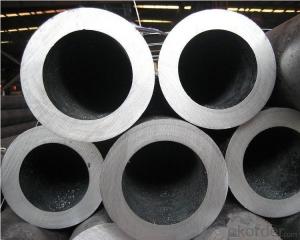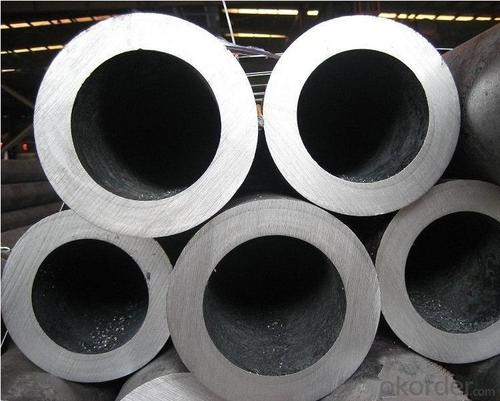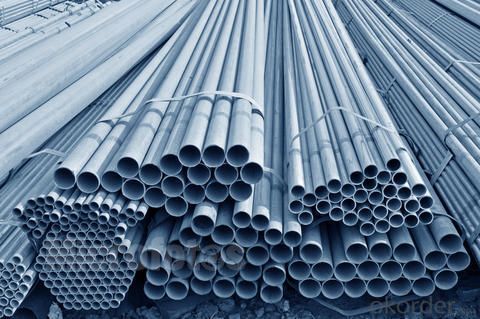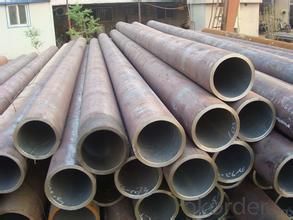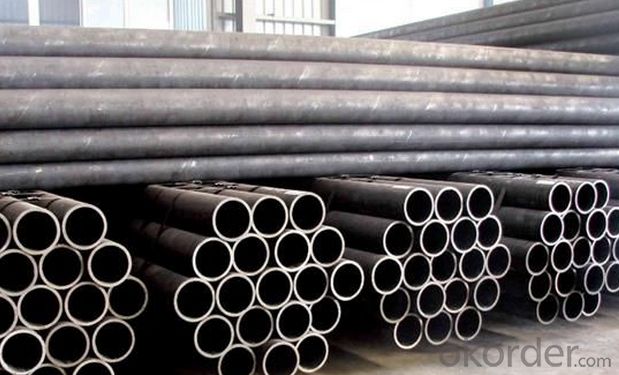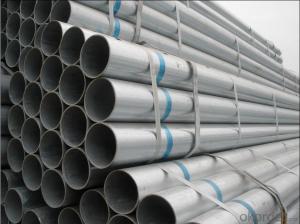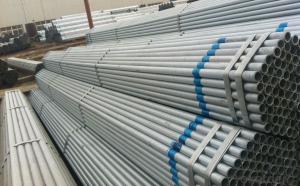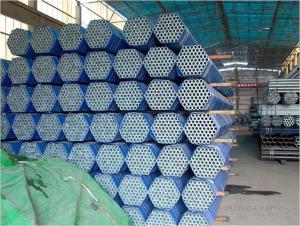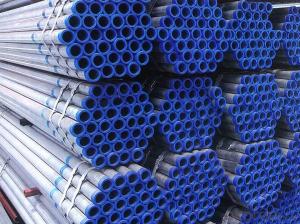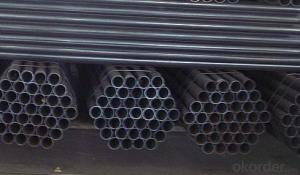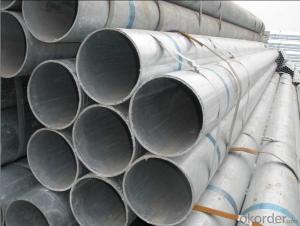BS1387 Galvanized Steel Pipe
- Loading Port:
- China main port
- Payment Terms:
- TT OR LC
- Min Order Qty:
- 5 m.t.
- Supply Capability:
- 100000 m.t./month
OKorder Service Pledge
OKorder Financial Service
You Might Also Like
Specifications
BS1387 Galvanized steel pipe
Material: Q195-235
Length:1-12M
Product Name: | BS1387 Galvanized Steel Pipe | |
Size | OD | 1/2-8” (20mm-219mm) |
Wall Thickness | 0.5mm-10mm SCH30,SCH40,STD,XS,SCH80,SCH160,XXS etc. | |
Length | Less than 12m | |
Ends | 1) Plain 2) Beveled 3) Thread with Coupling or cap | |
End protector | 1) Plastic pipe cap 2) Iron protector | |
Surface Treatment | 1) Bared 2) Black Painted (varnish coating) 3) Galvanized 4) With Oiled 5) 3 PE, FBE, corrosion resistant coating | |
Technique | Electronic Resistance Welded (ERW ) Electronic Fusion Welded (EFW) Double Submerged Arc Welded (DSAW) | |
Type | Welded Pipe | |
Welded Line Type | Longitudinal | |
Section Shape | Round | |
Inspection | With Hydraulic Testing, Eddy Current , Infrared Test | |
Package | 1) Bundle, 2) In Bulk 3) Bags 4) Clients' Requirements | |
Delivery | 1) Container 2) Bulk carrier | |
Date of Delivery | According To The Quantity And Specification Of Each Order | |
Payment | L/C T/T | |
Others | Fitting as screws and flange also can be supplied. | |
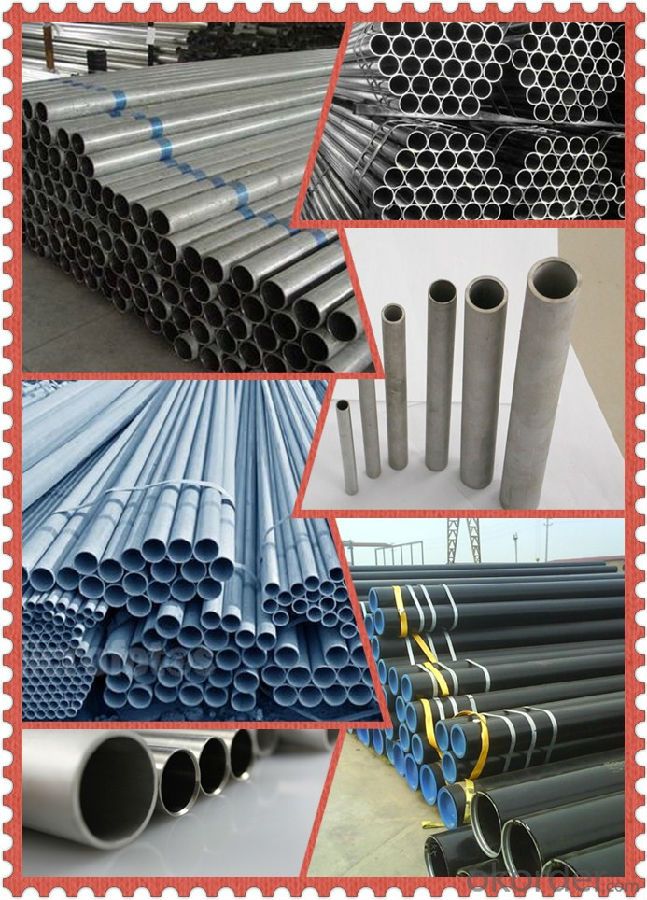
Usage of Our Products:
Construction | Outside | Workshop, agricultural warehouse, residential precast unit, corrugated roof, roller shutter door, rainwater drainage pipe, retailer booth |
Inside | Door, doorcase, light steel roof structure, folding screen, elevator, stairway, vent gutter | |
Electrical appliance | Refrigerator, washer, switch cabinet, instrument cabinet, air conditioning, micro-wave oven, bread maker | |
Furniture | Central heating slice, lampshade, chifforobe, desk, bed, locker, bookshelf | |
Carrying trade | Exterior decoration of auto and train, clapboard, container, isolation lairage, isolation board | |
Others | Writing panel, garbage can, billboard, timekeeper, typewriter, instrument panel, | |
- Q: Can steel pipes be used for underground applications?
- Yes, steel pipes can be used for underground applications. They are commonly used for underground piping systems in various industries such as water, oil, and gas. The durability and strength of steel make it suitable for withstanding underground conditions, providing reliable and long-lasting performance.
- Q: How to establish a concrete-filled steel tubular column model in ANSYS?
- A two unit model or a composite unit model can be adoptedTwo units are constructed of steel tubes and concreteA composite unit may be either a fiber element or a section conversion attribute
- Q: What are the different types of threading on steel pipes?
- There are several different types of threading commonly used on steel pipes, including tapered, parallel, and buttress threading. Tapered threading is typically used for pipes that require a tight seal, as the threads gradually narrow towards the end of the pipe. Parallel threading, on the other hand, has threads that run parallel to the pipe's axis and is often used for pipes that need to be easily assembled and disassembled. Buttress threading is a combination of tapered and parallel threading, featuring one side with a tapered thread and the other side with a straight thread. This type of threading is often used for pipes that require both a secure connection and easy installation.
- Q: Can steel pipes be used for hydronic heating systems?
- Yes, steel pipes can be used for hydronic heating systems. Steel pipes are commonly used in hydronic heating systems due to their durability, strength, and ability to withstand high temperatures and pressure. They are also resistant to corrosion, which is important for maintaining the efficiency and longevity of the heating system. However, it is essential to ensure proper insulation and protection against potential expansion and contraction issues that steel pipes may face when exposed to high temperatures.
- Q: How are steel pipes used in the construction of stadiums?
- Steel pipes are commonly used in the construction of stadiums for various purposes such as structural support, plumbing, and drainage systems. They provide strength, durability, and flexibility, making them ideal for constructing grandstands, roofs, and other large-scale structures. Additionally, steel pipes are used for installing plumbing systems to supply water for restrooms, concession stands, and irrigation. They also play a crucial role in the drainage system, allowing for efficient removal of rainwater and preventing flooding in the stadium. Overall, steel pipes are essential components in stadium construction due to their versatility and reliability.
- Q: What are the different types of fittings used with steel pipes?
- Steel pipes are commonly paired with various fittings that serve to connect, control, or alter the flow direction in a piping system. Some of these fittings include: 1. Elbow fittings: Designed to modify the flow direction, elbow fittings are available in different angles, such as 45 or 90 degrees. They are frequently utilized to navigate obstacles or introduce bends in the pipe. 2. Tee fittings: Tee fittings are implemented to create a branch or division in the piping system. With three openings, one perpendicular to the other two, they enable the connection of two pipes at a 90-degree angle. 3. Coupling fittings: Used to join two pipes of the same size, coupling fittings are typically threaded and can be easily fastened or removed with a wrench. They are commonly employed when pipes need to be connected or repaired. 4. Reducer fittings: Reducers are employed to connect pipes of varying sizes. They consist of one end with a larger diameter and another end with a smaller diameter. Reducers are often employed to transition between pipe sizes or adapt to different equipment or fittings. 5. Flange fittings: Flanges are utilized to establish a secure and leak-proof connection between pipes, valves, or other equipment. They consist of a flat, circular plate with holes to accommodate bolts or screws for fastening the flange to the pipe. Flange fittings find frequent use in applications that necessitate frequent disassembly and reassembly. 6. Union fittings: Union fittings are employed to join two pipes in a manner that facilitates easy disconnection. They comprise three parts: a nut, a female end, and a male end. Union fittings are commonly used in scenarios that require periodic maintenance or repairs. 7. Cap fittings: Cap fittings are employed to seal the end of a pipe. Usually threaded, they can be effortlessly screwed onto the pipe's end. Cap fittings are commonly used in instances where temporary closure or protection of pipes is necessary. These examples represent some of the various fittings utilized with steel pipes. The specific fitting required depends on factors such as the application, pipe size and material, as well as the desired functionality of the piping system.
- Q: What is the maximum bending radius for steel pipes?
- The maximum bending radius for steel pipes depends on various factors, such as the pipe diameter, wall thickness, and the type of steel used. Generally, larger diameter pipes with thicker walls have a larger maximum bending radius. However, it is important to follow industry standards and guidelines to ensure the structural integrity of the pipe is maintained during the bending process. Consulting the manufacturer's specifications or referring to relevant codes and standards, such as the American Society of Mechanical Engineers (ASME) B31.1 or B31.3, can provide specific information on the maximum bending radius for steel pipes in different applications.
- Q: Seamless steel tube 89X4 meters, how heavy?
- Generally seamless steel pipe wall thickness will be uneven, according to the theory, each meter is 8.3844 kilograms, but if the wall thickness is poor 20--30 wire, then the weight will increase some
- Q: Can steel pipes be used in high-pressure applications?
- Yes, steel pipes can be used in high-pressure applications. Steel pipes are known for their strength and durability, making them suitable for handling high-pressure fluids or gases in various industries such as oil and gas, chemical processing, and power generation. They are designed to withstand the stress and pressure exerted on them, ensuring reliable performance and safety in high-pressure environments.
- Q: Are steel pipes suitable for high-pressure applications?
- Yes, steel pipes are suitable for high-pressure applications. Steel pipes are known for their strength and durability, making them ideal for handling high-pressure applications. They can withstand the internal pressure exerted by fluids or gases under high pressure without deforming or bursting. The high tensile strength of steel allows it to resist the forces that occur in high-pressure environments, ensuring the safety and reliability of the piping system. Additionally, steel pipes can be manufactured with thicker walls to further enhance their ability to withstand high pressures. Steel pipes are widely used in industries such as oil and gas, petrochemical, power generation, and water distribution, where high-pressure applications are common.
Send your message to us
BS1387 Galvanized Steel Pipe
- Loading Port:
- China main port
- Payment Terms:
- TT OR LC
- Min Order Qty:
- 5 m.t.
- Supply Capability:
- 100000 m.t./month
OKorder Service Pledge
OKorder Financial Service
Similar products
Hot products
Hot Searches
Related keywords
